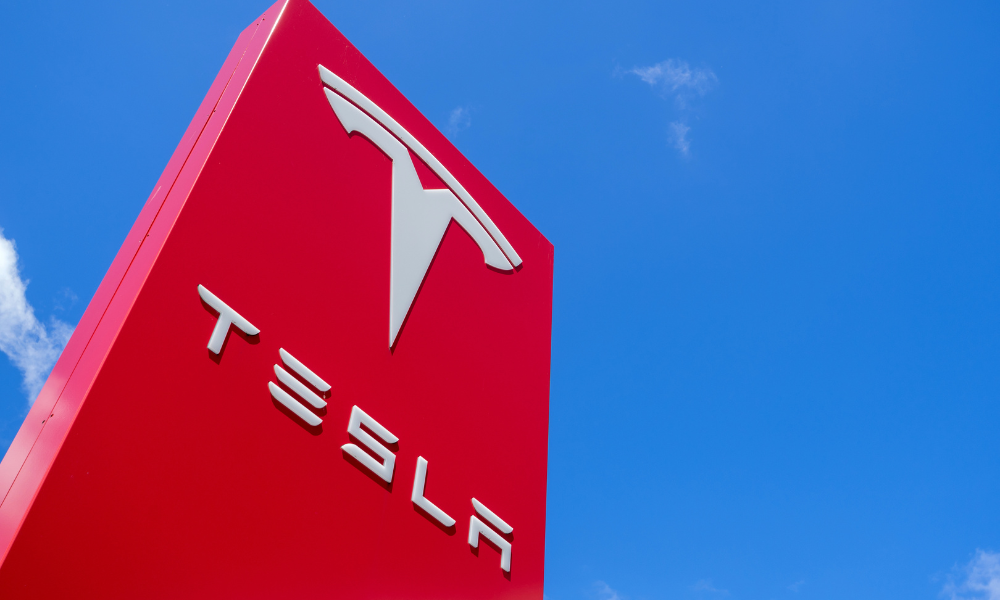

Tesla’s stock has seen a sharp decline in recent months, losing nearly half its value since December.
The electric vehicle maker, once a darling of Wall Street, is facing multiple headwinds, including falling sales, growing investor skepticism about its valuation, political controversies surrounding CEO Elon Musk, and the potential for retaliatory tariffs amid trade tensions.
Previously riding high alongside other Magnificent Seven stocks like Apple, Microsoft, and Nvidia, Tesla has plunged drastically from its post-election peak, trailing companies such as Berkshire Hathaway and Broadcom. While the remaining six companies in the group maintain an average operating margin of 37 percent, Barron's noted that Tesla’s margin for 2024 stood at just 7 percent, placing it closer to traditional automakers than to its former tech-focused peers.
Tesla’s valuation remains another point of contention among investors. The company’s stock currently trades at roughly 85 times earnings – down from 200 times just three months ago – but still well above the Magnificent Six’s average of 26 times earnings. Wall Street analysts appear divided on the stock’s future, with price targets ranging anywhere from $25 to $550. The wide disparity reflects deep uncertainty over the company’s ability to deliver on its long-term ambitions.
In addition to its financial struggles, Tesla has also experienced significant volatility. Over the past 12 months, its stock has traded within a range of $139 to $489 – a swing equal to 145 percent of its recent share price. In contrast, the remaining Magnificent Six stocks have shown more stability, with their typical fluctuation averaging less than 50 percent.
One major reason for Tesla’s historically high valuation has been investor confidence in its potential beyond the electric vehicle market. While Tesla’s automotive business accounts for nearly all of its revenue, less than one-quarter of its stock market value is tied to car sales, according to a recent Reuters review of analyses from banks and investment firms. Instead, the bulk of Tesla’s worth rests on the expectation that it will become a leader in artificial intelligence—particularly in self-driving technology and humanoid robotics.
However, despite Musk’s repeated promises since 2016 that fully autonomous Teslas were just a year away, the company has yet to deliver a driverless vehicle. The lack of progress has fueled skepticism about whether Tesla’s AI ambitions will materialize in a way that justifies its premium valuation.
Musk’s role in the Trump administration has further complicated Tesla’s public image. As a senior advisor and head of the Department of Government Efficiency, Musk has been involved in cost-cutting measures, including mass layoffs of federal employees. His political ties have drawn both support and criticism, with protests emerging outside Tesla showrooms in multiple cities, including Portland, Oregon, and New York.
Some demonstrators have labeled their movement the “Tesla takedown,” arguing that Musk’s close alliance with President Donald Trump is harming the company’s brand. While organizers say most protests have been peaceful, a few incidents have turned destructive, with fires intentionally set at Tesla facilities in Colorado and Massachusetts.
Trump has strongly condemned the protests, calling them an attempt to damage “a great American company.” Speaking at a White House media event, he stated, “You do it to Tesla and you do it to any company, we're going to catch you and you're going to go through hell,” BBC reported
When asked if he considered violent protesters to be “domestic terrorists,” the president responded, “I will do that,” a position later confirmed by a White House spokesperson.
Trump also blamed Tesla’s stock decline on what he called “radical left lunatics” on his Truth Social platform, accusing them of attempting to “illegally and collusively boycott” the company.
As if declining sales and political backlash weren’t enough, Tesla is now warning of potential trade risks. In a letter to the US Trade Representative’s Office that was viewed and reported on by Reuters, the automaker raised concerns that it and other American exporters could face retaliatory tariffs due to Trump’s aggressive trade policies.
"US exporters are inherently exposed to disproportionate impacts when other countries respond to US trade actions," Tesla stated in the letter. The company pointed to past trade disputes in which US-imposed tariffs led to increased duties on American electric vehicles abroad, making them less competitive in key international markets.
Tesla urged policymakers to consider the long-term consequences of new tariffs, stating that businesses would “benefit from a phased approach” that allows time for supply chain adjustments. The automaker also highlighted the difficulty of sourcing certain EV components domestically, suggesting that abrupt policy changes could harm American firms rather than protect them.
Trump is considering imposing significant new tariffs on imported vehicles and auto parts as early as April, a move that could trigger further trade tensions. While Tesla has been aggressively localizing its supply chain in recent years, the company’s global footprint means it remains exposed to potential countermeasures from foreign governments.

Canadian stocks are on a roll in 2025 as the country prepares to name a new Prime Minister.

Two C-level leaders reveal the new time-saving tools they've implemented and what advisors are doing with their newly freed-up hours.

The RIA led by Merrill Lynch veteran John Thiel is helping its advisors take part in the growing trend toward fee-based annuities.

Driven by robust transaction activity amid market turbulence and increased focus on billion-dollar plus targets, Echelon Partners expects another all-time high in 2025.

The looming threat of federal funding cuts to state and local governments has lawmakers weighing a levy that was phased out in 1981.
RIAs face rising regulatory pressure in 2025. Forward-looking firms are responding with embedded technology, not more paperwork.
As inheritances are set to reshape client portfolios and next-gen heirs demand digital-first experiences, firms are retooling their wealth tech stacks and succession models in real time.
